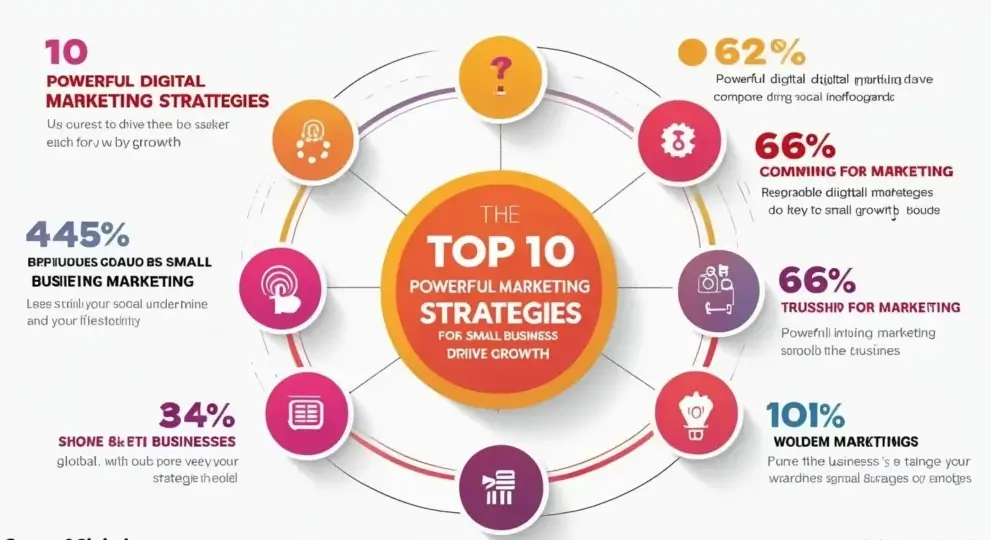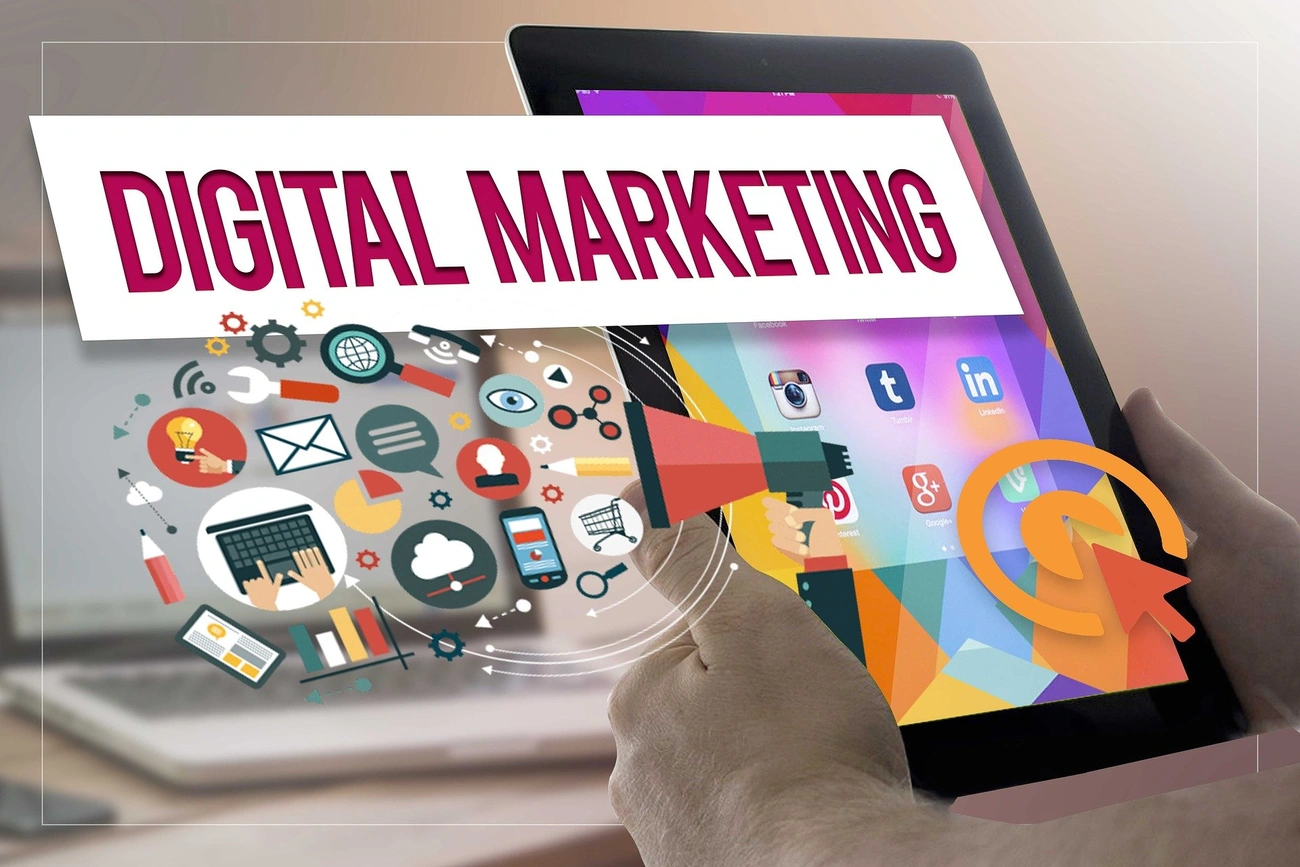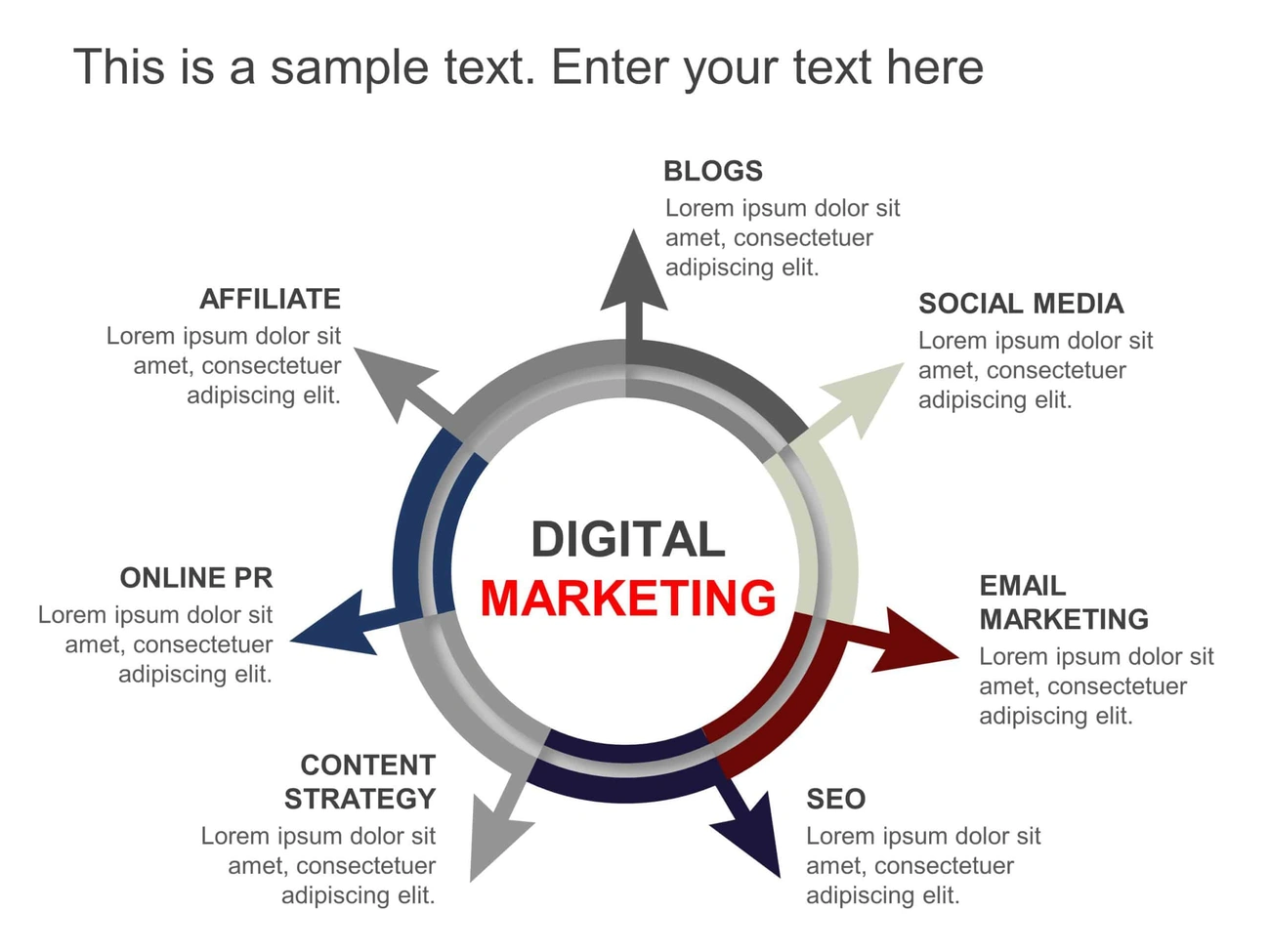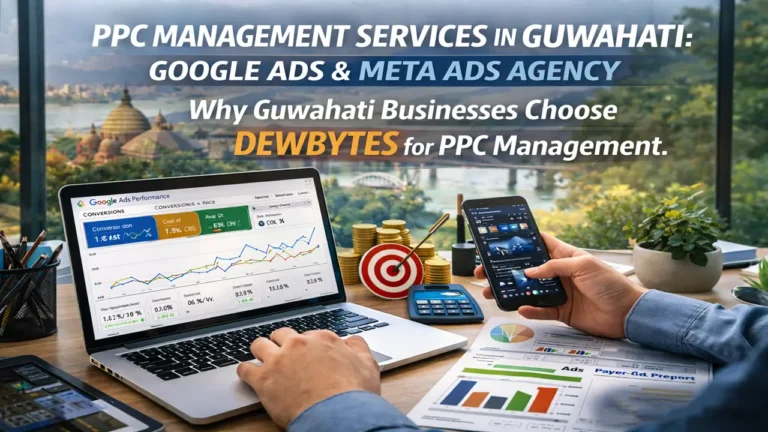With over 700 million internet users in India, digital marketing has become essential for small businesses to survive and grow. From local SEO services to influencer marketing, smart strategies can help even the smallest firms compete with larger players. This proven guide breaks down affordable, proven digital marketing strategies to take your business from zero to measurable success in just 30 days.
Digital marketing has become essential for small businesses in our connected world, not just an option. Social media, email marketing, and search engines help us compete better, build a strong online presence, and reach customers effectively. Social media platforms have revolutionized marketing in India and become crucial tools to reach new customers and boost brand awareness. For expert SEO Services, you can connect with Dewbytes, one of Guwahati and India’s top-rated SEO companies listed.
Small businesses can now compete head-to-head with larger companies thanks to effective digital marketing. A small New York bakery saw its website traffic jump 40% just by optimizing local keywords. Marketing experts have found that influencer marketing’s ROI matches or beats other marketing channels 89% of the time.
We’ll show you how to go from zero to profit in 30 days for your brand with proven digital marketing strategies for small businesses. Our practical, affordable approaches deliver measurable results through local SEO and social media marketing. Ready to begin?
Check Page Contents
ToggleUnderstanding the Digital Landscape for Small Businesses

Image Source: salaamainfo
The business world has undergone a fundamental transformation because of the internet. The digital world keeps evolving with 1.09 billion websites online and 252,000 new sites emerging daily. Online business now accounts for 29% of all transactions, which creates new challenges and opportunities for small enterprises.
Why digital marketing services matters today
Digital marketing’s global market value will reach £472.5 billion in 2025, with a 13.6% CAGR through 2033. Consumer behavior has dramatically changed toward online platforms. Companies now spend over half their marketing budgets on paid media and new technologies. Mobile advertising will make up 70% of all ad spend by 2028.
Digital marketing gives small businesses a chance to compete with larger rivals. Traditional advertising needs huge upfront investments, but digital marketing services can adapt to match your available resources while delivering results. Small businesses with tight marketing budgets find this especially valuable.
The precision of digital marketing makes it particularly powerful. Traditional media broadcasts messages to general audiences, but digital channels let you target specific demographics, interests, behaviors, and purchase intent. This targeted approach improves marketing efficiency by cutting wasted ad spend and creating personalized messages that appeal to specific customer groups.
How small businesses can compete online
Small businesses can outperform bigger competitors through strategic methods. Your Google Business Profile (GBP) optimization ranks among the most effective tools to compete locally. This free resource helps you control how your business appears in local search results and Google Maps.
Small businesses have advantages over corporate giants through their agility and authenticity. Quick decision-making and market adaptation come naturally without bureaucratic barriers. Your marketing can showcase real personality – something “faceless corporations” often lack.
Specialization in specific products helps establish your small business as an industry expert. Small businesses can provide more customized products to their customers without excessive overhead costs and red tape.
Small ecommerce ventures succeed by combining content, data, and customer experience. Social channels like Instagram, Facebook, and TikTok create additional revenue streams as ecommerce continues to evolve.
Common misconceptions about online marketing
Small business owners often hold beliefs that stop them from embracing digital marketing:
- “Digital marketing is only for large businesses” – Digital marketing helps small businesses reach wider audiences at a fraction of traditional advertising costs.
- “Success in digital marketing is immediate” – Building trust and improving your online presence takes time. Expecting instant success leads to disappointment.
- “High traffic equals digital marketing success” – Quality traffic that drives customer engagement and sales matters more than raw visitor numbers.
- “Only certain industries benefit from digital marketing” – Every business can employ digital marketing by using strategies that match their goals and their audience’s priorities.
- “Digital marketing is too technical and complex” – Many aspects of digital marketing are simpler than they appear, though some tasks like technical SEO need professional help.
The U.S. ecommerce market will reach 333.5 million users by 2029. Your business needs an online presence to survive and thrive. Understanding the digital world helps create marketing strategies that drive real business growth.
Key Challenges Faced by Small Businesses in India

Image Source: Campaign India
Small businesses in India struggle to implement digital marketing strategies. The country’s rapid shift to digital hasn’t made it easier for many enterprises to build their online presence. They face several key challenges.
Limited marketing budgets
Money is the biggest roadblock for small businesses trying to break into digital marketing. Small businesses can’t match larger companies that have their own marketing teams. Business experts suggest spending between 8.3% and 15% of revenue on marketing, based on B2B or B2C focus. Most small Indian businesses can’t afford to spend anywhere near these amounts.
Money problems create real challenges:
- They can’t compete with big brands in paid ads
- Marketing efforts stop and start due to cash flow
- Good tools and expert help remain out of reach
The good news? Digital marketing doesn’t always need big budgets. Email marketing stands out as one of the most affordable ways to keep customers engaged.
Cultural and regional diversity
India’s rich cultural mix creates unique marketing opportunities and hurdles. The country’s languages, traditions, and social customs shape a complex digital world that needs careful handling. These differences shape how customers think and how businesses work in different regions.
One-size-fits-all marketing doesn’t work in India. What strikes a chord in Mumbai might miss the mark in rural Punjab. The gap between city and village life adds complexity, as each setting comes with its own beliefs, practices, and needs.
Indian festivals and rituals play a big role in how people buy things. Marketing plans often need complete updates during major celebrations to stay relevant and respect local traditions.
Lack of digital skills and tools
Small businesses want to go digital but often lack the know-how. Studies show 79% of small and medium-sized employers see skill gaps in their teams. The biggest gaps are in technology (38%), artificial intelligence (33%), and basic digital skills (28%).
Small business owners worry about keeping up with tech changes. About 30% of businesses with 10-49 employees share this concern.
This knowledge gap means 60% of SMBs don’t have proper digital marketing plans and can’t track how well their campaigns work. Without understanding the numbers and analytics, they waste resources and miss chances to connect with customers.
Building a Digital Marketing Foundation

Image Source: edX
Small businesses need solid foundations to build effective digital marketing strategies. Three basic elements should be in place before launching successful campaigns.
Create a simple business website
Your website is the heart of all marketing efforts. It needs to be fast, mobile-first, and optimized for both search engines and AI tools. A proper website prevents wasting your marketing budget on traffic that doesn’t convert visitors.
Your business website creation follows a simple process:
- Plan your site’s structure based on your business type and audience
- Pick a template or start fresh
- Make the design match your brand
- Get your domain name
- Add your business details and contact info
My experience as a small business owner shows that websites with complete information rank better in search results. Your site must tell visitors what you do, where to find you, and your business hours.
Set up Google My Business for local reach
Google My Business (GMB) helps customers find you on Google Maps and Search when they look for services nearby. This free tool can substantially boost your local visibility.
A well-optimized GMB profile needs complete and accurate information. You should verify your ownership, update your hours regularly, and answer customer reviews quickly. Google ranks local businesses on relevance, distance, and popularity – you can’t pay for better local ranking.
Define your target audience and goals
Learning about your audience helps create powerful messages and compelling marketing campaigns. Good audience segmentation groups potential customers by age, location, occupation, and income.
Clear digital marketing goals keep your campaigns lined up with common objectives. These goals set expectations and motivate your team while showing what you can achieve with your resources.
Note that digital marketing typically takes 6-12 months to gain momentum and up to 2 years to show substantial results. The SMART framework (Specific, Measurable, Attainable, Relevant, Timely) helps focus your efforts and boosts your chances of success.
Effective Digital Marketing Strategies to Use

Image Source: SlideUpLift
Small businesses can reshape the scene with proven digital marketing strategies that need minimal investment. Here are five approaches that work and deliver actual results as you start your digital trip.
1. Local SEO and Google Maps optimization
Small businesses with physical locations must show up in local searches. Google shows customers nearby businesses that match their searches. Your Google Business Profile needs complete information to boost your local ranking:
- Your full business address
- Current phone number
- Accurate business category
- Updated operating hours
- Details like parking availability or Wi-Fi
Keep your Name, Address, and Phone number (NAP) the same across all online platforms. Your local rankings depend on relevance, distance, and popularity. More reviews and positive ratings will boost your visibility a lot in local searches.
2. Social media marketing for engagement
Small businesses can capture audiences naturally through social media marketing. Research shows 56% of small business customers now use social media more often. You can promote new products, talk with customers through comments, and share content that matches your brand values on Facebook, Instagram, and LinkedIn.
Set aside weekly time to keep your online presence active. Use hashtags to join broader discussions and gain likes, follows, and sales. You can also work together with accounts that share your values to reach their audiences.
3. Email marketing for customer retention
Email marketing gives you great returns—about INR 3037.70 for every rupee spent. This affordable method helps you nurture existing clients and keep customers coming back. New businesses can start with little or no cost, as some providers let you send up to 6,000 emails monthly free.
Personal touches make email marketing work better. Call recipients by name and share content they care about. About 80.8% of consumers say personalized content matters when they decide to open an email. Split your list based on what people bought and like to run targeted campaigns.
4. Content marketing to build trust
Content marketing builds trust by teaching and entertaining prospects instead of pushing sales. Small businesses can boost their brand visibility and build credibility without spending much. You can address common problems through how-to guides and tutorials that build trust over time.
Almost six in ten consumers recommend brands they trust, and seven in ten buy more from trusted brands. Regular valuable content shows you know your industry and want to help your customers.
5. Paid ads (PPC) to get quick visibility
Pay-per-click (PPC) advertising gets you quick results when you need immediate attention. You pay only when someone clicks your ad, so you retain control of your budget. This helps small businesses that want fast results without waiting to grow naturally.
PPC lets you target people based on their searches and interests. Run campaigns on search engines like Google, display networks, or social platforms like Facebook and Instagram. Dewbytes, one of the best Digital Marketing Agencies in Guwahati and India, can help create a strategic PPC campaign that boosts your visibility while managing costs.
Tracking Results and Improving Performance
![]()
Image Source: Improvado
Small businesses must measure their marketing effectiveness to optimize their digital presence. Operating without proper tracking is like walking blindfolded in the online world.
Use Google Analytics to monitor traffic
Google Analytics provides free tools that help understand your customer experience and improve marketing ROI. This platform shows you exactly how customers interact with your sites and apps throughout their lifecycle. You can track your visitors’ origin – whether they come from organic search, direct URL entry, referrals from other websites, or social media. Understanding these traffic sources helps you focus your resources on strategies that work.
Track conversions and ROI
Your digital marketing ROI becomes clear when you compare campaign costs to generated revenue. These metrics matter most:
- Open rates, click-through rates, and conversion rates
- Cost per lead and cost per acquisition
- Lifetime value of customers
UTM tracking codes in email links enable detailed tracking of website traffic and conversions. This data reveals which channels bring the highest conversion rates.
Adjust campaigns based on data
Smart budget allocation starts with identifying your best-performing digital marketing campaigns. A/B testing different content versions shows what appeals to your audience. You can then personalize content based on audience segments to boost performance.
Conclusion
Small businesses can now compete effectively in today’s market through digital marketing. This piece shows you don’t need huge budgets or technical know-how to build a strong online presence. Success starts with the basics – a simple website, an optimized Google Business Profile and a clear understanding of your target audience.
Digital marketing works best when multiple approaches complement each other. Local SEO helps nearby customers find your products. Social media creates lasting connections with your audience. Email marketing remains one of the most affordable ways to keep existing customers engaged. Content marketing helps you retain control in your industry. PPC advertising gives quick results when you need immediate visibility without waiting for organic growth.
Your specific business needs should determine which strategies to use. Google Analytics helps track traffic sources and ROI calculations show which channels deserve more resources. Small data-driven changes often create big improvements as time passes.
Starting your digital marketing experience might seem daunting. Taking steady steps over 30 days builds momentum naturally. Dewbytes, one of the best Digital Marketing Agency in Guwahati and India, can provide expert guidance tailored to your business. The digital world gives unprecedented chances to small businesses that adopt these strategies. You can compete effectively whatever your size or budget.
Key Takeaways
Small businesses can leverage digital marketing to compete effectively with larger companies through strategic, budget-friendly approaches that deliver measurable results within 30 days.
• Start with the foundation first: Create a simple website, optimize Google My Business, and define your target audience before launching campaigns.
• Focus on local SEO for immediate impact: Complete your Google Business Profile with accurate NAP information to appear in local searches where customers find you.
• Email marketing delivers exceptional ROI: Generate ₹3,037 for every rupee spent by personalizing content and segmenting your customer lists effectively.
• Track everything to optimize performance: Use Google Analytics to monitor traffic sources and calculate ROI to identify which channels deserve more budget allocation.
• Combine multiple strategies for best results: Integrate local SEO, social media, email marketing, content creation, and PPC advertising rather than relying on single channels.
The key to success lies not in implementing every strategy simultaneously, but in building a solid foundation, starting with cost-effective approaches, and continuously optimizing based on data-driven insights.
FAQs
Q1. What is the 70-20-10 rule in digital marketing?
The 70-20-10 rule is a content strategy guideline that suggests allocating 70% of your content to educational material, 20% to engaging content, and 10% to promotional content. This balanced approach helps maintain audience interest while subtly promoting your brand.
Q2. How can small businesses compete effectively online?
Small businesses can compete online by optimizing their Google Business Profile, focusing on local SEO, leveraging social media for engagement, using email marketing for customer retention, and creating valuable content to build trust. These strategies allow them to establish a strong online presence without massive budgets.
Q3. What are some cost-effective digital marketing strategies for small businesses?
Cost-effective digital marketing strategies for small businesses include email marketing, content marketing, social media marketing, and local SEO optimization. These approaches can deliver significant results with minimal investment, making them ideal for businesses with limited marketing budgets.
Q4. How long does it typically take to see results from digital marketing efforts?
Digital marketing typically takes 6-12 months to gain traction and up to 2 years before showing substantial results. However, some strategies like PPC advertising can provide quicker visibility. It’s important to maintain consistent efforts and regularly track performance to optimize your strategies over time.
Q5. What key metrics should small businesses track in their digital marketing campaigns?
Small businesses should focus on tracking metrics such as website traffic sources, conversion rates, cost per lead, cost per acquisition, and return on investment (ROI). Additionally, monitoring email open rates, click-through rates, and social media engagement can provide valuable insights into campaign performance.

I’m Azahar Hussain, founder of Dewbytes and a digital marketing professional based in Guwahati, Assam. With an MCA (Masters in Computer Application) degree and over 12 years of hands-on experience in IT, networking, web development, and SEO, I’ve spent more than a decade helping businesses across India and internationally build stronger online presence through practical, results-driven strategies.
My work centers around understanding what actually moves the needle for businesses—whether that’s improving Google rankings, developing high-performing websites, or creating sustainable lead generation systems. I don’t believe in shortcuts or temporary fixes. Instead, I focus on data-backed approaches that deliver consistent, long-term growth.
At Dewbytes, I work with clients ranging from small local businesses to established brands across different industries and geographies. As both a WordPress developer and SEO specialist, I bring a unique advantage: I understand how to build websites that not only look good but are technically optimized for search engines from the ground up. My services include custom website development, WordPress solutions, SEO strategies, website optimization, content planning, and targeted digital campaigns.
My approach is simple: listen to what the business needs, study the audience behavior, and build campaigns that align with real business goals. Whether I’m developing a new website or optimizing an existing one, I ensure every technical element supports better visibility and user experience.
While I’m based in Guwahati and have extensive experience working with businesses across the North-Eastern states, my expertise extends to serving clients throughout India and beyond. I understand both regional market dynamics and global digital trends, which helps me create strategies that work in diverse contexts.
My core expertise includes WordPress development, website design and optimization, search engine optimization, local and international SEO, digital brand development, and results-driven advertising campaigns.
Need help with your digital strategy?
If you’re looking for guidance on website development, SEO, or building a stronger digital presence, I’m available for consultations and project-based support. Let’s discuss how we can grow your business online.





